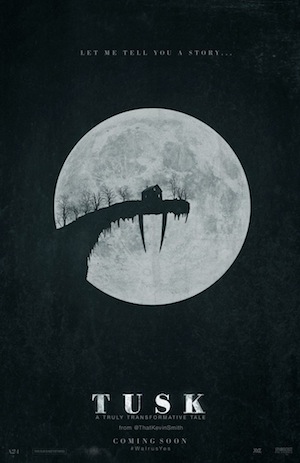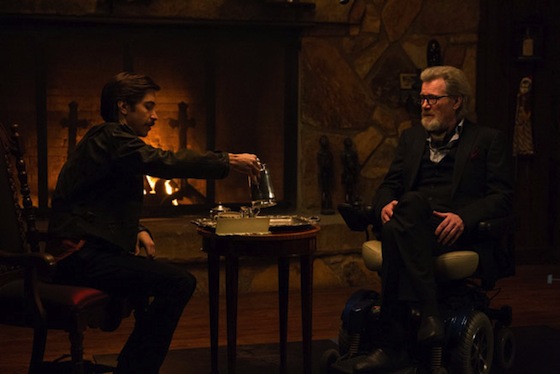If the new Kevin Smith movie seems like it was dreamed up as an off-the-cuff joke in one of the director’s many podcasts, that’s because it was. The fact that Smith saw the project through to fruition proves two things: He’s definitely not retiring from filmmaking as promised, and he still has a loyal fanbase willing to see what may have become the most expensive inside-joke ever stretched out to a feature-length film.
The problem with Tusk unfortunately is not that its absurd premise can’t make a decent movie, it’s that Smith doesn’t have a screenplay to support more than, let’s say, 30 minutes of screen time.
Smith’s ability to pad out scenes well after they have worn out their welcome is substantial, and it was only when the credits rolled that I saw that he himself was the editor. Bad move. Not only could another editor have ‘trimmed the fat’ so to speak, but perhaps a real pro would have been able to put the scenes together in a more interesting way, rather than structuring the film according to the most basic tenets of continuity and match cuts.
Simply put, the story — as bizarre as it seems on the surface — is way too predictable to support a standard narrative style. Smith’s weakness has always been in his lack of stylistic control, and rarely has it shown more than in Tusk.
As soon as I give you the slightest plot summary, you’ll think I must be crazy. It’s true, the premise is nuts. And I was looking forward to another unhinged Smith horror flick, like his independently financed Red State. But Tusk is only unhinged in the premise department. Here it is: A narcissistic LA podcaster (Justin Long) travels to Canada and is held hostage by a psychopath (Michael Parks) who wants to surgically turn him into a walrus.
Rather than the plot unfolding with any real sense of urgency (like it did in Red State at least), it’s more like watching a really boring game of Connect Four. You know Smith has to fill in slots one, two, and three to get to four, so when a series of contrived (and mostly unfunny) sequences finally reach the destination you’ve been waiting for, there’s a sigh of relief — if nothing else because Smith is working so hard to get there.
Long is insufferable. In his defense, he’s supposed to be. His character is a self-important blowhard with a microphone who has no pity for anyone, let alone his co-host (Haley Joel Osment), who eagerly plays second fiddle. Smith is supposedly lampooning the very culture he thrives on, but his targets are too easy and his critique too obvious to qualify as decent parody. Once Long’s character gets to Canada, the really lame Canadian jokes start, and it’s a sad comment on his writing that the professional actors in Tusk have a way harder time making Smith’s dialogue funny than the amateur actors of his 1994 debut Clerks.
One professional actor, who by turns elevates the material and is also sunk by it, is Johnny Depp. Buried under a mound of prosthetics and makeup (and credited only as his character’s name Guy Lapointe), Depp plays an outrageous caricature of a French-Canadian detective. His dialogue is filled with non-sequitur nonsense that goes on forever, punctuated by downright hilarious flourishes. Again, if Smith were able to edit this performance down, it might have been more effective.
Parks is the only one who actually commits to Tusk, and there are times where you actually believe the emotional journey of his sea-faring storyteller-cum-Human-Centipede-surgeon. We don’t need this quality in every horror comedy, but it sure helps balance out the crazy when there’s a semi-believable moment thrown in. Otherwise, it just feels like everybody’s trying too hard.
To his credit, Smith has a trick or two up his sleeve plot-wise, but it’s nothing when compared to the anything-can-happen vibe of his dark thriller Red State. He deserves props for following this whimsy all the way through, but all things considered, Tusk is a suspense-less, predictable film that’s seriously hampered by a lack of narrative invention and unique style.











Comments on this entry are closed.